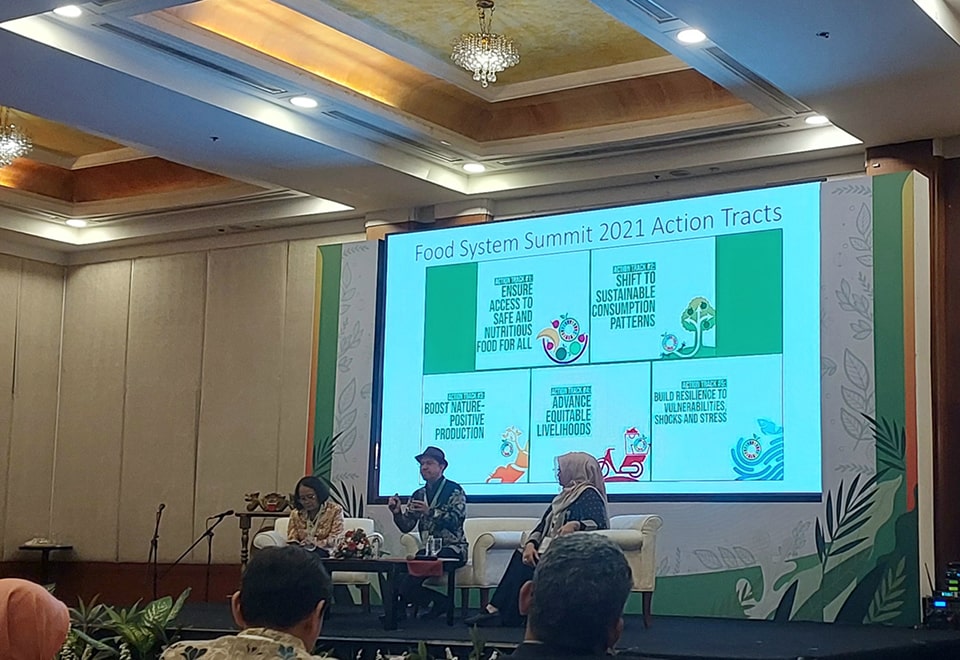
JAKARTA, Indonesia—Dr. Glenn Gregorio, Center Director of the Southeast Asian Regional Center for Graduate Study and Research in Agriculture (SEARCA), was one of the plenary speakers in the session on "Bridging Disciplines for Holistic Solutions/Integrated Actions on Sustainable Food Systems" at the 2nd SEAMEO International Conference on Food and Nutrition (ICFN 2024) organized by the Southeast Asian Ministers of Education Organization (SEAMEO) Regional Centre for Food and Nutrition (RECFON), held on 17–18 October 2024 at Redtop Hotel in Jakarta, Indonesia.
With the theme "Understanding the Challenges, Gains, and Opportunities in Environmental Nutrition Research, Programs, and Policies in Southeast Asia," ICFN 2024 covered food systems, indigenous food and nutrition, sustainable diets, environmental food factors, and food security. The conference aimed to enhance understanding of the gains, challenges, and opportunities associated with environmental nutrition in Southeast Asia.
In his talk, Dr. Gregorio centered on the current state of sustainable food production and its future outlook. He emphasized the potential of Southeast Asian countries as agribusiness hubs, with their agriculture upgraded and transformed from traditional farming to a globally competitive agribusiness industry.
"There is a need to strengthen local supply chains and commodity clusters to enhance Southeast Asia's integration into global value chains," Dr. Gregorio said.
Moreover, he discussed Southeast Asia's market overview post-COVID-19 pandemic, noting the shift in consumer behavior from a just-in-time to a just-in-case model, wherein people resorted to stocking and seeking alternative food sources; the trend toward home cooking with a focus on healthier and higher-quality food; and the growing importance of local sourcing and home gardening for self-sufficiency.
Lastly, Dr. Gregorio proposed strategic actions needed to sustain Southeast Asia's agribusiness sector, including addressing supply chain gaps and other coordination issues; providing support to small farmers, especially with access to technologies, technical knowledge, and finance; promoting climate-resilient agriculture; investing in rural infrastructure, innovation, and research and development; and strengthening regulatory and certification systems.
Other distinguished speakers invited to the session were Prof. Rina Agustina of Fakultas Kedokteran Universitas Indonesia, who emphasized the importance of culturally acceptable planetary health diets, echoing the EAT-Lancet Commission's recommendations, and Prof. Drajat Martianto of Institut Pertanian Bogor University, who presented on the importance of reducing food miles or the distance food travels from production to consumption.
Ms. Beatrisa Martinez, SEARCA Executive Coordinator, and Ms. Zara Mae Estareja, SEARCA Senior Associate for Public Relations, served as rapporteurs for the plenary session. They also managed the Center's institutional exhibit showcasing the School-plus-Home Gardens Project (S+HGP) and its offshoot projects: the School-plus-Home Gardens cum Biodiversity Enhancement and Enterprise (SHGBEE) in Cambodia and Busuanga, Philippines, and the School Edible Landscaping for Entrepreneurship (SEL4E) project in Rizal Province, Philippines.
The event was co-organized by SEARCA and SEAMEO Regional Centre for Tropical Biology (BIOTROP).